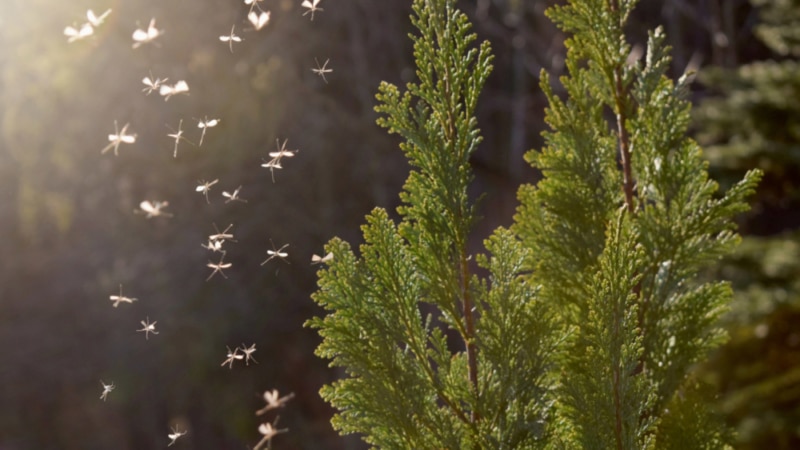Every dog owner (and probably cat owner) has heard of heartworms (a parasitic roundworm). And you probably know how devastating they can be to your furry friend – they can result in heart failure, lung disease and other organ damage. But what you may not know where these potentially deadly little threats come.
Heartworms are passed to your pet through mosquito bite. And while they are not as dangerous for cats as dogs (as the FDA notes, cats are not natural heartworm hosts), heartworms are something all pet owners want to avoid if at all possible.
Several pet owners in southern California found this out the hard way recently, as an outbreak of mosquito-borne heartworm made its presence known just after the start of the new year in three Orange County communities. And the same species of mosquitoes that pass on heartworm are certainly present right here in north Georgia and metro Atlanta.
In fact, 16 different mosquito species can yield heartworm infection – though the Aedes, Anopheles, and Mansonia species are the most common culprits. And, yes, all three of those blood-sucking types are here (in abundance) in north Georgia.
The truly obnoxious factor is that the same mosquitoes that infect your pet with heartworm, can also infect yourself or family members with several other diseases, including Zika, dengue, chikungunya, malaria, Venezuelan equine encephalitis virus, West Nile virus, and St. Louis encephalitis virus.
In other words, mosquitoes are significant health threat, and something you want to avoid as much as possible. Now, we’re not unrealistic enough to think that you can avoid mosquitoes altogether. But there are several things you can do to minimize your and your pets’ risk of catching anything nasty from one of those buzzing bloodsuckers.
The first thing you should do is to make sure your pets are under the care of veterinarian and up to date on their flea, tick, and heartworm medication – which will prevent worms from ever bothering your dog or cat.
The second thing you can do is to address your own environment. This means addressing your property and making sure that you’re doing everything you can to discourage mosquitoes from inhabiting and laying eggs in your vicinity.
How to help prevent mosquito infestation
 The first thing you need to do is inspect your property – do you have any standing water anywhere around your home? Mosquitoes can lay eggs in even the tiniest amounts of undisturbed, stagnant water.
The first thing you need to do is inspect your property – do you have any standing water anywhere around your home? Mosquitoes can lay eggs in even the tiniest amounts of undisturbed, stagnant water.
That means you should get rid of, cover, or turn over any items that could hold water, including tires, buckets, cans, flower pots and saucers, toys.
You should also remove/drain any small pools of standing water from around your home, or make sure that any ponds have moving water (install a small pump system). There are also mosquito-repellents available for purchase at local home improvement stores that you can apply to ponds to keep eggs from hatching in the water. This means you should empty, scrub, and change the water in pet bowls and bird baths at least once a week. You an also fill holes inside dead trees or stumps with dirt or sand to prevent further mosquito breeding.
You should also ensure that your gutters are clean – mosquitoes can even lay eggs in tiny cataracts caused by dead leaf.
Also, make sure any water storage containers, such as rain barrels, are tightly closed.
There are also things you can do to your home itself to keep mosquitoes from getting inside, including installing and/or repairing screens on windows and doors. Make sure they cannot get in and your pets – and your family – will be much safer from any species of mosquito.
You should also wear insect repellant (preferably one with the active ingredient of DEET) when going outside – especially into the woods or away from your home, where you know you keep standing water to a minimum. However, know that DEET does not kill mosquitoes, it simply keeps them from trying to bite you – and to do that during a north Georgia summer you may have to make sure every inch of exposed skin is covered by spray.
Request a Free Quote
Zone Home Solutions has five locations around the Atlanta area. Contact us to get a free, no obligation project quote.
There is another mosquito-affecting alternative, however, one that does kill and repel those winged pests – and one that does not require as much vigilance on your part. Monthly mosquito control treatments as applied by a knowledgeable and licensed pest control company have been proven to effectively decrease the mosquito population.
Pest control professionals come to your home to determine the parameters of the property and infestation level and will work with you to determine the treatment plan that works best for your needs.
These treatments allow you to take back your yard and spend time outside without having to bathe in repellant. And while you should always ensure that your dog or cat is treated for mosquito-borne heartworm – you never know where Fido or Mittens may roam – you can at least rest a little bit easier that your property is not ground zero for a mosquito outbreak.
The professionals at Zone have been helping backyards across north Georgia become no-fly zones for mosquitoes for years and know exactly how to help you with your infestation this spring and summer. Simply call us today and one of our helpful representatives will schedule a visit from our service technician as soon as possible. Contact us now at 770-904-5432
We are proud to be the #1 rated metro Atlanta Pest Control Company on Kudzu, and are proud members of the National Pest Management Association.
